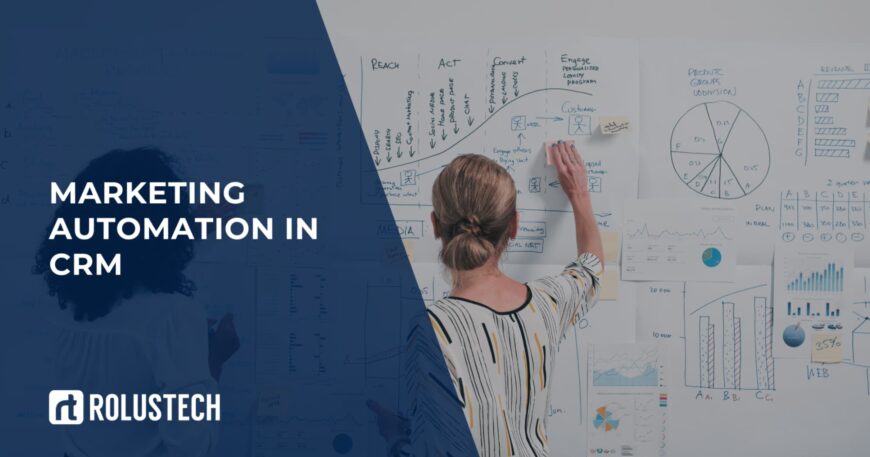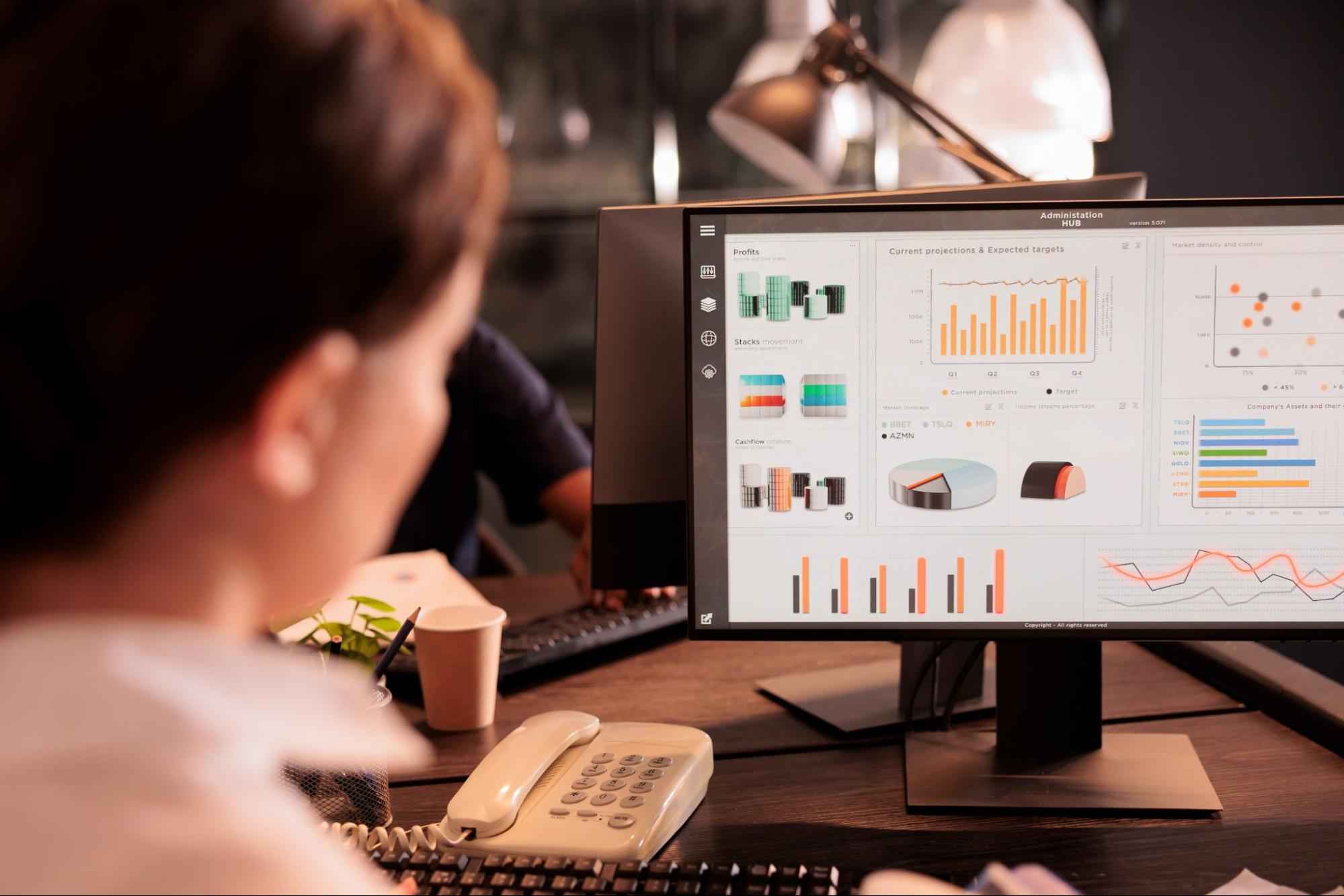In 2025, marketing automation and CRM are still the ultimate power couple. Together, they help businesses attract, engage, and retain customers more easily. This combo makes every marketing move smarter and every sales move faster.
Think of CRM as the memory, and marketing automation as the action. One stores your data, the other puts it to work – automatically. You save time, cut guesswork, and reach people when it actually matters.
But it’s not just about speed anymore. In 2025, it’s about personalization, real-time decision-making, and privacy-first marketing. Customers expect brands to know what they want before they say it – and do it without being creepy.
That’s where this duo shines. CRM keeps your customer data clean and updated. Marketing automation then uses it to send the right message at the perfect moment.
Whether you’re a small business or a growing enterprise, this combo scales with you. It helps you do more with less – less time, less effort, and less budget waste. And it works across all your favorite platforms.
What is Marketing Automation?
Marketing automation is software that helps you run your marketing campaigns without doing everything manually. It takes care of repetitive tasks like sending emails, scoring leads, and posting on social media. You set the rules – and it works in the background.
If you’re wondering what marketing automation in CRM is, it’s the smart system behind the scenes. It connects with your CRM to track what your customers do and respond instantly. No delays, no missed chances – just timely, automated actions that feel personal.
This is also how marketing automation works with CRM: the CRM gathers data, automation uses it. So, when someone visits your site or opens an email, the system knows and reacts. It can send a follow-up email, assign a sales rep, or trigger a special offer – automatically.
It’s like having a marketing team that never sleeps, never forgets, and always hits “send” at the right time. In 2025, that’s not a nice-to-have. It’s a must.
Marketing Automation vs CRM: What’s the Difference in 2025?
Marketing automation and CRM work together, but they aren’t the same thing. Think of them as two sides of the same coin – each plays a different role in your customer journey.
One focuses on marketing. The other handles relationships.
Here’s how they compare in 2025:
| Feature | Marketing Automation | CRM |
| Main Purpose | Automates marketing tasks | Manages customer data and interactions |
| Primary Users | Marketing teams | Sales and support teams |
| Key Functions | Email campaigns, lead nurturing, A/B testing | Contact tracking, deal management, follow-ups |
| Customer Journey Focus | Top and middle of the funnel | Bottom of the funnel and after-sales support |
| Action Triggered By | Behavior, engagement, campaign rules | Sales pipeline status, tasks, communication |
So, while marketing automation creates interest and drives leads, CRM helps convert and retain them. You need both to create a complete customer experience – from first click to loyal customer.
Top Marketing Automation Software in 2025
Looking for the best marketing automation tools this year? Whether you’re running a startup or scaling fast, 2025 has options for every kind of business. From AI features to budget-friendly plans – there’s something for everyone.
Best Marketing Automation Tools for Small Businesses
ActiveCampaign is a go-to for small teams. It’s simple, smart, and helps you send the right message at the right time. You get email flows, lead scoring, and a built-in CRM.
Mailchimp is still a favorite in 2025. It’s great for beginners and solo marketers. It offers drag-and-drop email builders, basic automation, and new AI content suggestions.
Klaviyo is perfect if you’re in eCommerce. It pulls customer data straight from your store and sends targeted emails or texts. Shopify, WooCommerce – whatever you use, it fits right in.
Top AI-Powered Marketing Tools 2025
HubSpot now comes packed with AI. It suggests subject lines, analyzes customer behavior, and even builds workflows for you. It’s powerful and user-friendly, even for non-tech teams.
Marketo is built for bigger businesses. Think enterprise-level automation, advanced analytics, and deep integrations. It’s ideal if you want more control and customization.
SharpSpring is making waves with its all-in-one approach. You get emails, landing pages, social scheduling, and CRM features – plus solid reporting to tie it all together.
Every tool here helps you do one thing: automate smarter. Choose based on your goals, your team size, and the channels you care about most.
Leading CRM Platforms for Marketing Automation
Your CRM isn’t just a contact list anymore – it’s the engine that powers smarter marketing. The best ones in 2025 come built with automation, AI, and analytics that move fast and think ahead.
Best CRM with Marketing Automation Features
Salesforce leads the pack in enterprise automation. Its AI, Einstein, predicts customer behavior and recommends the next best action. You get deep customization, powerful integrations, and endless ways to scale.
HubSpot CRM is perfect for growing teams. It combines marketing, sales, and service tools in one easy platform. With workflows, email automation, and smart segmentation, you can personalize every step of the journey.
Affordable CRMs with Automation in 2025
Zoho CRM gives you solid automation without the big price tag. It has scoring rules, campaign triggers, and even social media engagement tools. Great for small to mid-sized teams.
Pipedrive is built for sales-first teams, but its new marketing add-ons make it a strong all-rounder. Set triggers based on deals or actions, and keep leads moving with minimal manual work.
Microsoft Dynamics 365 takes automation to the enterprise level. It blends sales, marketing, and customer service in one place. Plus, it integrates natively with all your favorite Microsoft tools.
These CRMs with marketing automation help you stay one step ahead – without extra effort. Choose one that matches your business model, not just your budget.
Key Features & Benefits of Marketing Automation in CRM
Marketing automation in CRM isn’t just about saving time – it’s about doing smarter work with better results. Here are the top features and what they mean for your business in 2025:
- Automated Lead Scoring
Score leads based on behavior, engagement, and demographics – automatically. Focus your energy on the ones most likely to convert. - Drip Campaign Management
Set up automated email sequences that nurture leads over time. Stay top of mind without spamming. - Multichannel Outreach
Reach people via email, SMS, ads, and more – all from one platform. Meet customers where they already are. - Lead Nurturing at Scale
Guide thousands of leads through your funnel with personalized content. No manual follow-ups needed. - Real-time Customer Segmentation
Group your audience based on behavior or traits as it happens. Send the right message to the right person at the right time. - Analytics, Dashboards & Reporting
Track campaign performance with clear visuals. Know what’s working and where to tweak. - Predictive Campaign Suggestions
Use AI to recommend subject lines, send times, or content types. Let the system do the heavy thinking. - ROI Tracking and Attribution Modeling
Know exactly where your results are coming from. Tie revenue back to specific campaigns or channels.
These features turn your CRM from a static database into a dynamic growth engine. And the best part? They keep getting smarter.
New for 2025: Emerging Trends in Marketing Automation
As we step into 2025, marketing automation continues to evolve with cutting-edge trends that change how businesses engage with customers. Let’s dive into the trends you should watch for this year:
AI-Powered Automation & Smart Triggers
AI is now the brain behind most automation. It predicts customer actions, sets up smart triggers, and personalizes content automatically. With AI-powered automation, your CRM learns customer behavior and adapts in real time – making every interaction feel more human.
Omnichannel Marketing Integrations (Web, SMS, Email, In-app)
Customers expect consistent communication across every channel. In 2025, marketers are focusing on seamless integration of web, SMS, email, and even in-app messaging. Whether they browse your website, open an email, or text you, your system knows where to pick up the conversation.
Social Media Marketing Automation (e.g., Meta Ads + CRM Workflows)
Social media is no longer just for engagement – it’s part of the sales journey. By linking social media automation with your CRM, you can trigger actions like lead capture from Meta ads and follow-up emails. This multi-step workflow maximizes lead conversion and streamlines marketing efforts.
These trends are shaping the future of marketing automation, driving smarter, faster, and more personalized customer interactions in 2025.
CRM Innovations Powering Modern Marketing in 2025
CRM systems are evolving rapidly, driven by new technologies and innovations that enhance marketing efforts. Here are the CRM innovations powering modern marketing this year:
Machine Learning & Predictive Analytics
Machine learning is revolutionizing CRM systems. It helps businesses predict customer behavior and recommend the best actions. With predictive analytics, you can foresee future trends, identify at-risk customers, and personalize marketing campaigns with better precision.
Enhanced User Privacy & GDPR 2.0 Compliance
As privacy concerns grow, CRM systems are adapting with stronger security features. With GDPR 2.0 compliance, businesses can ensure that customer data is protected. This includes encrypted data storage and transparent consent processes, building trust with customers while avoiding fines.
Real-Time Sales & Marketing Alignment Features
In 2025, CRM systems are blurring the lines between sales and marketing. New real-time alignment features enable seamless collaboration. Sales teams get instant updates on marketing campaigns, while marketing teams gain insight into the sales process, improving lead handovers and conversion rates.
These innovations are transforming CRM systems into powerful tools that shape every step of the marketing process – making customer interactions more personalized, secure, and efficient.
New & Noteworthy Tools to Watch in 2025
The CRM landscape in 2025 is full of exciting new tools and integrations that push the boundaries of automation and personalization. Here are some standout innovations to keep an eye on:
AI-driven CRM Systems: Salesforce Einstein, HubSpot AI
Salesforce Einstein and HubSpot AI are taking AI-powered CRM to the next level. These systems now predict customer behavior, suggest next steps, and automate marketing actions. With more advanced machine learning, businesses can deliver highly personalized experiences at scale.
New Integrations: Zoho + WhatsApp, ActiveCampaign + Shopify
Zoho CRM’s integration with WhatsApp allows businesses to engage customers directly via chat, enhancing communication and support. Similarly, ActiveCampaign’s integration with Shopify helps eCommerce brands automate follow-up emails and product recommendations, increasing sales efficiency and customer retention.
These new tools and integrations will make CRM marketing more intuitive, data-driven, and customer-centric in 2025.
Rolustech Case Studies: CRM Meets Marketing Automation
See how businesses leveraged CRM integrations with marketing automation tools – powered by Rolustech. These real-world examples highlight the efficiency and impact of combining CRM with automation for enhanced customer engagement and streamlined operations.
1. Evolution Marketing (Darren Flood)
In this project, Rolustech integrated SugarCRM with several key tools, including JIRA, OneDrive, and custom plugins. This integration enabled the synchronization of project management, file sharing, and detailed case management directly within SugarCRM.
The result was improved team collaboration and a more organized workflow across platforms, ensuring that sales and support teams stayed in sync and productive.
2. Credaris
Rolustech helped Credaris, a loan broker, integrate Emarsys for marketing automation within SugarCRM. By syncing customer data and marketing campaign responses between Emarsys and SugarCRM, sales teams gained valuable insights into customer engagement.
This allowed for better follow-up on campaigns, increased lead nurturing, and more personalized customer interactions.
3. Finding Friday
The client specializes in CRM for the Travel and Leisure Industry. The company strives to connect travel and leisure companies with potential travelers and tourists.
Their primary need was to integrate marketing automation tools so that their clients, to whom the solution was sold, could run successful marketing campaigns, nurture leads along the sales cycle, and reach out to more customers in less time with little effort. MailChimp, Act-On, and integrations were done with SugarCRM.
These case studies show how CRM systems combined with marketing automation tools can revolutionize customer engagement, automate tedious tasks, and boost business efficiency. Whether it’s project management integration or automated marketing insights, Rolustech’s solutions empower businesses to achieve better results with less effort.
Final Thoughts: The Future of CRM and Marketing Automation
As we move deeper into 2025, the key to success lies in adaptability. Businesses must stay flexible – ready to pivot as tools, platforms, and customer behavior evolve.
Compliance isn’t optional anymore. With new regulations like GDPR 2.0, aligning your CRM and marketing practices with privacy laws is essential to build trust and avoid penalties.
Lastly, focus on integration. A disconnected tech stack creates gaps in data, customer journeys, and results. When CRM and marketing automation work as one, your business gains speed, insight, and precision.
The future favors businesses that connect smart tools with smarter strategies.










